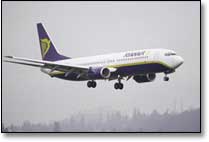| Ryanair mulls ‘upmarket’
service boost
 Ryanair,
the European low-fare airline, is going "upmarket," according to a recent
report in the Sunday Times of London. Ryanair,
the European low-fare airline, is going "upmarket," according to a recent
report in the Sunday Times of London.
Among changes the newspaper reported: The airline will replace its distinctive
blue cloth seats with leather upholstery. It will jettison the dog-eared
in-flight magazine in favor of a new content-driven glossy publication.
And it will add highend electronic goods to the catalog of inflight merchandise.
The new image marks a departure for Ryanair, which previously made a
virtue of its spartan in-flight service.
FULL STORY >>

Honeywell, Airbus team on anti-crash
system
Airbus and Honeywell International Inc. have come up with technology
that would take control of airplanes to prevent them from crashing into
obstacles, reported The Wall Street Journal, the Associated Press
and Reuters.
According to the report, which cited Honeywell executives, the system
would link crash-warning devices, already common on airliners, with cockpit
computers that could automate flying to prevent collisions.
Tests have shown "promising results," the Journal reported,
but the idea of completely turning an airplane's controls over to a computer
is bound to make people nervous. European airplane maker Airbus—owned
by EADS and the United Kingdom's BAE Systems—has been working on the project
with Honeywell for years, and development sped up after the Sept. 11,
2001, terrorist attacks.
A prototype of the system, which could keep planes from crashing into
mountains and prevent the use of aircraft as weapons, has been tested
on a limited scope on small aircraft, the report said. When audible warnings
from crash-avoidance systems are ignored, the system would override actions
by the pilot and make evasive maneuvers if needed, the Journal
said.
Boeing, NASA, and the U.S. Department of Defense are all looking into
such technology but are not thought to be as far along as Honeywell and
Airbus, the Journal said.
According to the report, Honeywell has held early-stage talks with some
airlines and regulators on the issue.

IN BRIEF
Japan plans urban missile defense
Japan's planned missile defense system will concentrate on protecting
urban areas and strategic bases, since protecting the entire archipelago
around the clock is virtually impossible, reported Dow Jones. The news
service quoted a recent report from Kyodo News wire service, citing Japan
Defense Agency officials.
The greater Tokyo area will be doubly guarded by destroyers equipped
with the Aegis air defense system and Patriot Advanced Capability-3 surface-to-air
missile units, but protection to the rest of the country will vary, the
officials said. Most regional urban centers will be excluded from the
areas the PAC-3 system is to cover, and the anticipated disparity in treatment
is expected to cause heated debate in upcoming deliberations in the Diet,
the Japanese parliament, on the missile defense system, Kyodo reported.
The agency's plan calls for the government to categorize emergency situations
in levels according to urgency and prepare defense activities based on
the situation, they said. Under the scheme, when there is heightened possibility
North Korea might launch a ballistic missile at Japan, the agency would
dispatch two or three Aegis destroyers to the Sea of Japan and deploy
PAC-3 units to six locations. These would mostly include big cities, Kyodo
reported.
The defense system is aimed at intercepting a missile in two stages—first
during its flight outside the atmosphere with the Aegis ships and then
just prior to its hitting the ground with the PAC-3 units.
The government intends to launch a missile defense system in fiscal 2006
at the earliest. The total cost of deploying the system is estimated to
amount to more than 1 trillion yen ($8.4 billion U.S.).
Fla. Tech to honor Columbia crew
Initially dubbed Crane Creek residence hall when it was being built,
a new complex of seven dormitories at the Florida Institute of Technology
in Melbourne, Fla., will be dedicated to the memory of Space Shuttle Columbia
and its crew, reported the newspaper Florida Today.
The school will name the on-campus complex Columbia Village. Each of
its seven residence halls will bear the names of the seven Columbia astronauts—Col.
Rick Husband, Cmdr. William McCool, Capt. David Brown, Dr. Kalpana Chawla,
Lt. Col. Michael Anderson, Capt. Laurel Clark and Israeli Air Force Col.
Ilan Ramon.
A formal dedication ceremony is scheduled for Oct. 28.
"It's really fitting," Stephanie Rafferty, an astronomy and physics student
at Florida Tech, told the newspaper. "A lot of students have high appreciation
for the space program."
Florida Tech has always had a close connection to the space program.
The school's Grissom Hall is dedicated to the memory of Apollo I astronaut
Gus Grissom, who received the first honorary doctorate at Florida Tech
in 1962. In the center of campus, there also is a memorial to the Space
Shuttle Challenger at a spot where students gather to watch launches from
Kennedy Space Center, Fla.
|